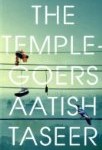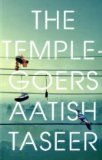The Temple-goers has an impressive blurb. It is described as being as “seductive and unsettling” as The Reluctant Fundamentalist and like an Indian version of Netherland. The author was heralded as the ‘Indian Brett Easton Ellis’ by The Bookseller and as ‘a writer to watch’ by V.S. Naipaul. I’m a big fan of Indian novels and so was excited about reading it.
Unfortunately I don’t think The Temple-goers lived up to the hype, but I wonder if that is because I didn’t fully understand/appreciate the complexity of the novel.
The book is set in modern day India and focuses on a young man who has returned from the West to rewrite his novel in cosmopolitan Delhi. The central character, Aatish, is named after the author and we follow him as he struggles to adapt to the fast changing city.
Aatish strikes up a friendship with a gym trainer and together they enjoy getting drunk and having sex, always ensuring they visit the temple afterwards to atone. The balance between ancient tradition and the modern way of life is an interesting concept for a novel, but I failed to connect with any of the characters and so I found myself not caring what they got up to.
Throughout the book we hear about Aatish’s novel writing, which is often criticised:
Sanyogita didn’t like the writer. She felt he wasn’t kind; that was her word. She had begun many books of his. I think she read them for my sake rather than out of any real interest; and later I felt she finished them for the same reason. One lay by her bedside now.
‘I can’t!’ she said, standing in front of a dressing-table mirror, her head cocked to one side as she put in an earring, ‘I just can’t. I’ve tried, but they’re so dry. And he’s not kind to his subjects.’
All the criticisms reflected my thoughts on The Temple-goers, so I wonder if this book is a satire on novel writing. I can’t understand why someone would deliberately create a dry novel with characters that you can’t connect to, but that does appear to be the case here. The way the author has named the character after himself also seems to suggest this.
There were some interesting sections on life in modern day India and the book had an easy-to-read, fast pace, but I found most of the book quite dull.
Recommended to people who enjoy experimental writing – perhaps one of you will be able to explain this book to me at some point!


18 replies on “The Temple-goers – Aatish Taseer”
Hmmm I’m not sure that I could say I like experimental writing so while the blurb sounds interesting I might wait until someone explains it as well 🙂
Amy, LOL! I hope someone comes along and lets us know the meaning of this book soon!
I’m sorry to hear you didn’t enjoy it that much. To be honest, I don’t really have a clue when it comes to writing styles (yet?) so I think I’ll wait and see if I like experimental writing.
Iris, There is a good discussion on experimental writing here:
http://katesbookblog.blogspot.com/2006/03/whats-experimental-about-experimental.html
There is a lot of arguement about what it means, but I tend to call think of it as a new writing style that pushes the boundary of novel writing. I normally prefer more conventional books!
i do read experimental books but have a lot on tbr pile so will only get this as a book sale book ,and had read a couiple of reviews when it first came out and thought it wasn’t quite my thing ,like yyou i like indian novels but this will have to wait ,all the best stu
Stujallen, If you enjoy experimental then I think you’d like this. I’d love to hear your thoughts on it, so I hope you get round to it at some point.
It isn’t speaking my name I don’t think…
Sandy, I can see why!
I’m trying to read more experimental fiction so I can get a better handle on whether I like it or not. I like to be able to nail down my reading tastes so I can prove them wrong later on. But this one sounds a little too coyly self-referential for me.
Jenny, I think the problem with experimental is that each one is so different that you can’t really say whether you will like them all 🙂 Nailing down that reading taste is so hard – good luck!!
I like some experimental fiction, but it’s the reference to him being the Indian Bret Easton Ellis that makes me wonder. I read Less Than Zero as a teenager in the eighties, and thought it was the greatest book ever–but I wonder if I would think so now. I think some books have a very specific audience and/or a specific time that makes them more accessible.
Priscilla, I haven’t read any Bret Easton Ellis, although he is one of those authors that I feel I should have tried. I do think that we have very different tastes as we age, so I would be interested to see what I make of one of his books. Perhaps I’ll give Less Than Zero a try and let you know!
I think it sounds like you understood what the author was trying to do but just didn’t like it! It may have been a good effort at experimental writing, but that doesn’t mean it’s your fault if it doesn’t succeed.
Lija, I’m not convinced I do understand, as I have no idea why someone would do that – it doesn’t make sense to me. Hopefully someone will come along and explain this book to me!
I like the title, I would definitely give the book a second look. I don’t think I’ve heard of the author before but it’s been some time I have been in India.
I’m sorry the book disappointed you.
Violet, This is the author’s first novel so it isn’t surprising you haven’t heard of him. He has written a non-fiction book (Stranger to History) as well, but I do think we will hear much more about him as the years go on.
All I can think about is how the main character is a writer of the same name. I don’t get the sense that it’s ego but rather something more self-deprecating? I’m curious about how he came across.
It’s interesting, despite your valid criticisms I find myself still interested by the book!
Shannon, I think it is great that you are still interested in the book. I really hope that you decide to read it as I’d love to hear another person’s thoughts on it.